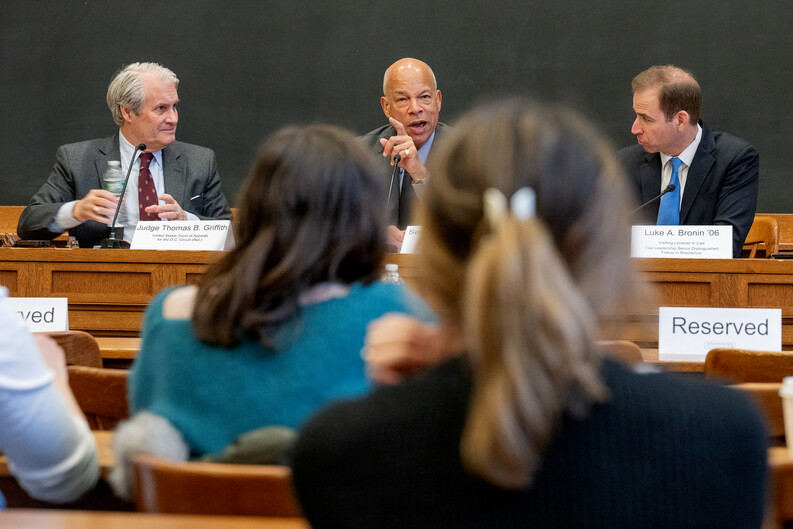Crossing Divides Welcomes Secretary Jeh Johnson and Judge Thomas B. Griffith

The Crossing Divides Program hosted Secretary Jeh Johnson in conversation with Judge Thomas B. Griffith at Yale Law School on April 3.
The conversation, which centered on the importance of working across ideological divides, was moderated by Luke Bronin ’06, Visiting Lecturer in Law and Tsai Leadership Senior Distinguished Fellow in Residence at Yale Law School, and former mayor of Hartford, Connecticut.
“This series is dedicated to the principle that it is foundational in democracy that we are able to have spirited debate that is respectful and that we are able to have tough conversations in a serious way,” said Bronin in his introduction.
Bronin led the conversation by asking the two speakers about their views on the importance of working across divides.
Griffith said he believed it is a “better way to live” to treat others with respect — even when they hold diametrically opposite views. It’s also foundational to American democracy. “What the Constitution created was a system by which we debate reasonably and we arrive at compromise,” he said.
“If you want to support the Constitution, make this your mantra — ‘On a contested issue, I will seek to moderate and to unify, because that’s the spirit with which the Constitution was created.’”
Judge Griffith was appointed to the United States Court of Appeals for the D.C. Circuit by President George W. Bush in 2005, and to the Presidential Commission on the Supreme Court by President Joe Biden in 2021. He is Special Counsel at the law firm Hunton Andrews Kurth, a Fellow at the Wheatley Institution at Brigham Young University, and a Lecturer on Law at Harvard Law School.
Secretary Johnson, who served as the U.S. Secretary of Homeland Security from 2013 to 2017, is a partner at the law firm Paul, Weiss, Rifkind, Wharton and Garrison LLP, where he also co-leads the firm’s Cybersecurity and Data Protection practice. Johnson has also served as General Counsel of the U.S. Department of Defense and as General Counsel of the U.S. Department of the Air Force.
“Working across divides is essential to get stuff done,” said Johnson. “One of the things that I learned from President Obama was that when we pushed a piece of legislation, he felt it was important that it be something sustainable and durable [that would] survive multiple administrations. The way to do that is to gain bipartisan support to some degree.”
In his experience, bridging partisan divides sometimes starts with simple gestures, Johnson went on. While in office, he’d often stop by the offices of members of Congress for unscheduled visits — what he called “drive-bys.” These informal chats often created meaningful points of connection with individuals who held views very different from his own.
Johnson also noted that talking with people with whom you disagree often has the benefit of improving understanding of complex issues.
“I’ve learned more about an issue by talking to someone who in an intelligent way disagrees with me about an issue,” he said. “By going through that process, the strength of your position is better because you considered something you might not have considered before.”
Much of the conversation centered on the work of the American Bar Association’s Task Force for American Democracy. Both speakers are members of the task force, and Johnson serves as co-chair (with Judge J. Michael Luttig, who visited Crossing Divides in February). Dean Heather K. Gerken was appointed to the task force last year.
Johnson noted that the ABA Task Force comprises a bipartisan group with a range of perspectives. One of its goals is to educate Americans on the foundational role of democracy and the rule of law in American life.
“We need enough people in positions of influence who respect [constitutional] norms as well as the letter of the law,” he said.
Another of the major emphases of the task force, said Griffith, is to help transpose the civility of the courtroom into other areas of public debate.
“Of all the people in the nation, lawyers ought to be the ones at the forefront at getting rid of the contempt in our public discourse. When you’re in court, you have to treat your opponent civilly, and speak respectfully to the judge,” said Griffith. “We also think those are the values we ought to take out into the public square.”
Since Crossing Divides launched last fall, the program has hosted eight events featuring jurists, Yale Law faculty members, scholars, and other high-profile leaders. On April 16, Crossing Divides will welcome Chief Judge Sri Srinivasan and Judge Amul Thapar for a discussion of the techniques and habits of mind that have helped them work across political divides throughout their tenure on the federal bench.
To find more information on upcoming Crossing Divides events, visit The Tsai Leadership Program’s website.


